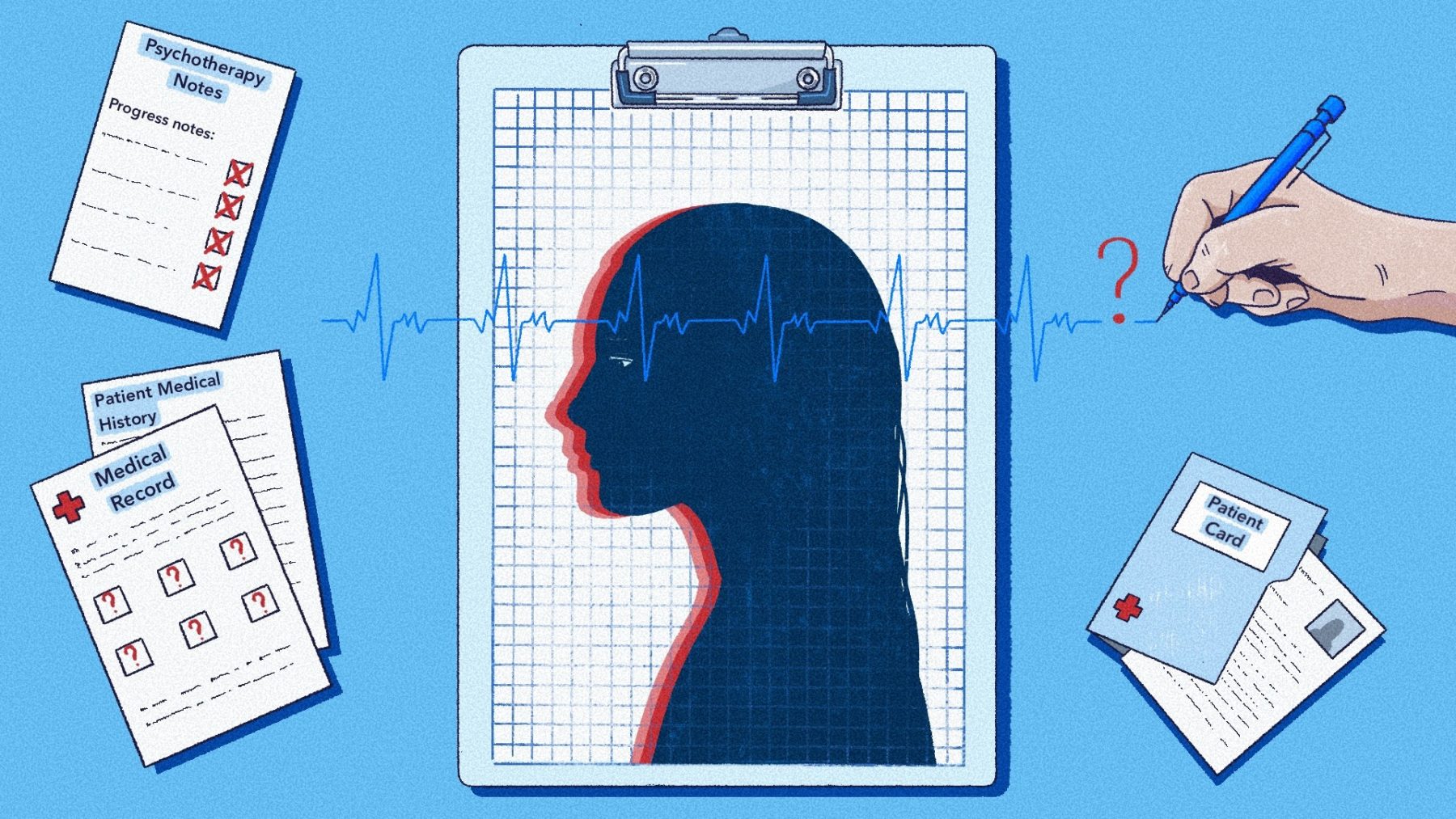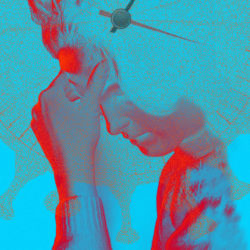
Teo Uratadze
When the doctor doesn’t listen
- Illustrations by Teo Uratadze
In 2017, the London Review of Books published a commentary from an anonymous young woman with a prolonged illness that had seriously impaired her ability to care for herself. The situation was “infuriating,” she wrote in the short but impassioned article.
“Something that happened to me and was beyond my control has left me like a machine that’s been switched off – disabled – unable to do anything that a 21-year-old of my intelligence and interests might want or need to do,” she wrote.
That young correspondent, Maeve Boothby O’Neill, spoke Russian, listened to jazz and read constantly. She loved musical theater, especially the shows “Wicked,” “Billy Eliot” and “Into the Woods.” She was plotting out a series of 1920s mystery novels set in the villages of Dartmoor, an upland expanse of bogs and rivers and rocky hills in southwest England where Maeve and her mother had once lived.
Maeve died on October 3, 2021. She was 27. On the death certificate, her physician noted “myalgic encephalomyelitis” — an alternate name for the illness known as chronic fatigue syndrome — as the cause. It is rare for a death to be attributed to either ME or CFS.
An inquest into the circumstances, including the actions (and inactions) of clinicians and administrators at the local arm of the National Health Service, or NHS, is expected to be held later this year. Maeve was diagnosed with the illness in 2012, after several years of poor health. She fought hard to access appropriate medical care and social service support from institutions and bureaucracies that did not seem to understand the disease.
“She did everything she could to survive,” wrote Sarah Boothby, Maeve’s mother, in a statement she prepared for the upcoming inquest. The NHS “did not respond to the severity of Maeve’s presentation, and failed in its duty of care,” wrote Boothby, adding that her death was “premature and wholly preventable.”
Maeve’s father and Boothby’s ex-husband, Sean O’Neill, a journalist at The Times, brought widespread attention to ME in a series of articles, including one last year about Maeve. His “creative, courageous” daughter, wrote O’Neill, “struggled not just with the debilitating, disabling effects of ME but also with the disbelief, apathy and stigma of the medical profession, the NHS and wider society.”
Myalgic encephalomyelitis is frequently triggered by an acute viral or other infectious illness, although it has also been associated with exposure to environmental toxins, including mold. Patients have been found to suffer from a range of immunological, metabolic, neurological and other dysfunctions. Core symptoms include profound exhaustion, a pattern of relapses after minimal exertion known as post-exertional malaise, brain fog, poor sleep and heart rate irregularities that lead to dizziness or nausea when in a standing position. Standard therapies have focused on symptomatic relief since the underlying causes remain unknown and there are no diagnostic medical tests.
According to the U.S. Centers for Disease Control and Prevention (CDC), between 836,000 and 2.5 million people in the country have what it refers to as ME/CFS, and most remain undiagnosed. In the U.K., the estimates range from 125,000 to 250,000. Many patients are unable to work, climb stairs or even perform basic daily functions without assistance.
As a journalist and public health academic, I have been investigating and writing about ME for several years. I have learned how it can devastate the lives of patients and their families, not least because mainstream medicine has framed it as largely psychosomatic — a modern version of what would once have been diagnosed as hysteria or conversion disorder.
From the start of my project in 2015, I found it to be enormously intellectually and emotionally rewarding. But no one besides desperately ill patients took much notice. Editors at major news organizations couldn’t be bothered. Academic colleagues were polite but perplexed at my dedication to this obscure domain. At gatherings with friends, I could tell they’d had enough after the fifth or eighth time I’d mention the latest developments in the field.
Viral epidemics always leave in their wake a small percentage of people experiencing chronic complications that have no identified cause. And the prolonged medical complaints being reported by millions of people around the world after acute coronavirus infection include some of the key symptoms that define ME.
Patients, clinicians, scientists and journalists are debating and investigating the overlaps between the two conditions. While long Covid is a grab-bag term for an extremely diverse group of patients, some are receiving clinical diagnoses of ME or ME/CFS, as it is often called these days.
And just as ME patients have long felt dismissed or misunderstood, long Covid patients have had similar experiences. As I reported last year for Coda, for example, doctors unable to continue working because of long Covid have been dismayed that their medical colleagues often tell them their cognitive impairment and repeated relapses are physical expressions of pandemic-related trauma. Conditions like ME and others that lack definitive medical tests — such as irritable bowel syndrome, Gulf War Illness, fibromyalgia and various forms of pain — are often lumped together into a category called “functional” disorders or “medically unexplained symptoms,” known as MUS.
The emergence of long Covid has focused widespread attention on a long-simmering debate that has previously been confined largely to academic and medical circles: Do these functional and medically unexplained ailments arise mainly from ongoing disease processes or from depression, anxiety, post-traumatic stress disorder and related psychiatric conditions?
All around the world, leading scientists and clinicians regard long Covid as a heterogeneous disease. They are seeking to elucidate its many pathophysiological pathways and find drug targets for therapy. In December 2022, the CDC reported that long Covid “played a part” in 3,544 deaths in the U.S. from the start of the pandemic through June 2022.
Another camp is applying the psychosomatic lens to long Covid. The experts in this group also hold impressive academic status, receive significant research funding and publish in respected journals. They witness the same phenomenon and see something completely different: A global tsunami of mass hysteria leading to paralysis, gait disorders, memory loss, inability to remain upright without feeling sick, repeated flu-like relapses and a list of other complaints.
Medicine has a long and sorry history of bias and discrimination on the basis of sex. Given that ME and other functional and medically unexplained disorders are known to be much more prevalent among women, it is not surprising that patients with these conditions routinely report receiving poor treatment and even abuse at the hands of the healthcare system. Physicians frequently prescribe psychotherapy and exercise programs based on their presumption that emotional or mental distress, negative or unhelpful thoughts and/or unhealthy behavior patterns are causing the persistent problems.
It goes without saying that stress, anxiety and related factors can have negative health impacts and exacerbate underlying ailments and that psychological support and lifestyle adaptations can help alleviate distress, including among people with chronic conditions. But when it comes to medically unexplained illnesses, mistakes in interpreting symptoms can visit trauma and despair upon patients and families.
Last May, an Irish court ordered a hospital to pay a young man 6 million euros for having failed to diagnose a brain tumor, an error that delayed necessary surgery by months. Doctors had misdiagnosed his headaches, concentration problems and hand numbness as “psychological and functional” and referred him to “the mental health services and physiotherapy,” according to the Irish Independent.
Physicians can be quick to default to psychological explanations when they don’t understand what is causing a patient’s problems, noted Brian Hughes, a psychology professor at the University of Galway, in a blog post about the case. (Professor Hughes is a friend and colleague.)
“It would be nice if the doctors concerned could perhaps try to be a little less hasty, and a bit more humble,” he wrote in the post. “The phrase ‘Medically Unexplained’ does not mean ‘Medically Unexplainable.’ Just because you don’t know what’s wrong with a patient doesn’t mean that nothing is wrong with them.”

Maeve Boothby O’Neill was born in 1994 in London. Her parents divorced when she was five, and from then on she lived with her mom in southwest England — first in Dartmoor, and then in Exeter, a major university town.
In pulling together the following account, I spoke multiple times with Maeve’s mother, Sarah Boothby, via social media as well as in her cozy flat on a quiet road a few blocks from Exeter’s High Street — the same flat where Maeve had struggled with her declining health and where she’d died the previous fall. While there, I reviewed three fat clip binders stuffed with copies of Maeve’s medical and social service records, voluminous correspondence, reams of handwritten notes and journal-type entries, applications for social benefits and related documents and writings.
The Royal Devon University Health NHS Trust, which oversees the hospital where Maeve sought care during the last months of her life, did not respond to an email seeking comment.
From an early age, Boothby told me, Maeve adored “storytelling” in all its forms and loved being surrounded by books. She wrote her first play — or rather, she dictated it — when she was seven. “She played happily in her imagination for days on end,” said Boothby.
Maeve expressed her opinions early. During a family vacation to southern Spain, Boothby recalled, Maeve, then four years old, declared: “What’s the point of Spain? It’s too hot!” At 10, she became a vegetarian out of both principle and gustatory preference.
In the summer of 2007, when Maeve was 12, both she and Boothby came down with what felt like a mild viral illness. Boothby recovered completely after four weeks. But according to Maeve’s diary from that time, she still felt exhausted weeks after the acute sickness.
(Boothby read the diary after Maeve’s death. It opened with this advisory: “The writing beyond this page is strictly private and is only to be viewed with the express permission of Maeve.” Boothby posted the following snippets and others from the diary on Twitter. )
“God I am TIRED,” Maeve wrote on August 7. On August 11: “Oooohh . . . tired . . .” August 12: “I am still vair [very] tired! Why?! Mum has said she wants me to stay in bed all day and rest :¿ (got a tiredness headache too. Ow ow ow ow).” August 17: “in bed – still tired :(”
Besides the references to exhaustion that pepper the diary, Maeve also expressed delight about compelling personal matters — celebrating her birthday, getting a new dollhouse, visiting her dad in London.
Just after 11 p.m. on August 25, the night before her birthday, she wrote:
“It is 53 minutes until I’m 13! OMG! We (me & dad) went shopping today…the plan tomorrow is to have a nice breakfast then a picnic with PINK CHAMP [champagne].” And at midnight: “I am officially 13 years old and have made it to TEENAGERDOM!” 12:01 p.m.: “Wow! I’m 13!”
Over the next few years, Maeve’s exhaustion increased, sometimes accompanied by punishing headaches. She began fainting while engaged in gym class, school sports, dancing and even walking. Her social life dropped off significantly and she reduced her school attendance to essential classes only, although she managed to keep up her grades.
Two general practitioners examined Maeve, found nothing wrong and dismissed her symptoms as “normal for a girl of her age,” said Boothby. A pediatrician referred Maeve to psychological services while telling her “the symptoms were all in her mind,” wrote Boothby in her inquest statement.
“She was only 15 and doubted herself for years afterwards,” Boothby told me.
Spontaneous remission from ME is relatively rare, although the disease is known to fluctuate. Many patients remain more or less stable for years, and some improve slowly. Others, like Maeve, experience a gradual decline, for reasons that remain unclear. It is estimated that about a quarter of patients are home-bound or even bed-bound.
In 2012, despite her reduced class attendance, Maeve graduated from high school in Bristol, where she and her mother were living for a year. She earned top grades in Russian, biology and English literature. She’d long imagined a career involving travel, foreign languages and international relations.
In a photo of Maeve on her 18th birthday, she glows with good humor. Her bright face is graced by a half-moon smile and framed by a tangled mane of brown hair. Her eyes are focused on some point to the left of the camera. She seems, like many her age, to be brimming with ideas and secrets and vital insights. Unlike her peers, she was too sick to attend university and explore her future.

Photo: Courtesy of Sarah Boothby and Sean O’Neill.
That year, Maeve was finally referred for assessment to a clinic specializing in CFS/ME, as the illness was then often called, at a hospital in Bristol. Although the intake and diagnostic process dragged on for nine months, a specialist at last confirmed that she had the illness. In a subsequent email to the specialist, Maeve expressed relief at getting the news.
“It feels very empowering to finally have a diagnosis and some external recognition of my symptoms, to know that it’s not all in my head!” she wrote.
Shortly afterwards, Maeve and her mother returned to Exeter, where she contacted the local CFS/ME clinical service and reviewed their guidelines for treatment and care. These guidelines recommended a behavioral and psychological approach to recovery based on the hypothesis that patients like Maeve were extremely out of shape from remaining sedentary and harbored dysfunctional beliefs about having an organic disease that caused them to relapse when they did too much.
For decades, two related interventions were viewed as the standard-of-care for ME. A specialized form of cognitive behavioral therapy was designed to alter patients’ faulty beliefs so they would do more. An approach to increasing activity called graded exercise therapy (GET) was designed to reverse their physical deconditioning so they would do more. A major British study called the PACE trial, with the first results published in 2011 in the Lancet, appeared to demonstrate that these treatments led to significant improvement and even recovery.
The information Maeve received in 2012 conformed to this approach. Leaflets advised her that “many people with CFS/ME have unhelpful thoughts,” which include “catastrophizing,” “eliminating the positive” and “all-or-nothing-thinking.” Instead of adopting these patterns, the leaflets advised, patients should ask themselves questions like: “What alternative views are there?” and “How would someone else view this situation?” and “Am I focusing on the negative?”
Maeve found this approach useless but did see a specialist in Mickel therapy, a cognitive approach popular in the U.K.. In a journal entry, Maeve wrote that, according to the therapist, “I should have more fun and be more childlike” and “my body’s ‘message’ is: my symptoms are here to tell me to stop containing my emotions and start expressing them honestly now.”
She dropped the therapy after a couple of sessions. “It isn’t working for me,” she wrote. “If anything it’s making me worse, because I’m worrying about not having fun.”
As advised by the CFS/ME service, Maeve kept a meticulous activity diary in an effort to determine her “baseline” — the amount she could do without triggering the relapses that characterize post-exertional malaise. The goal was to increase the amount over time in order to nudge her body to improve. Maeve regularly struggled to stay within her limits.
In an email to the doctor who diagnosed her, she expressed concern that her legs ached after any physical activity. “Don’t worry about the aching of the legs,” the doctor replied. “That will not go until you enter a phase of sustained improvement — then it will, I promise you!”
“I’m looking forward to entering a period of sustained improvement so I can have my legs back!” Maeve responded in a follow-up email.
The doctor’s promise proved to be illusory. Maeve never entered a period of “sustained improvement.” Eventually, she realized her baseline was around 30 minutes of activity a day. If she exceeded it, she suffered a relapse — or a “crash,” as patients called it. And as she struggled to accept this restriction, she crashed again and again.
In the years since the Lancet and other journals published findings from the PACE trial, medical and public health experts — including me — have documented that the study includes egregious methodological and ethical missteps. Related research has also been shown to be poorly designed and fraught with bias. In 2015, I wrote a 15,000-word exposé of the PACE trial that garnered significant media and scientific attention, and I have continued to criticize research in the field.
In 2017, the CDC rescinded its recommendations for CBT and GET as treatments for the condition. The CDC website now flatly declares: “ME/CFS is a biological illness, not a psychologic [sic] disorder…These patients have multiple pathophysiological changes that affect multiple systems.”
On October 31, 2021 — less than a month after Maeve’s death — the U.K.’s National institute for Health and Care Excellence, or NICE, issued new clinical guidelines for ME/CFS that reversed the agency’s own prior recommendations for the two treatments. In a review of studies, NICE assessed the quality of evidence in favor of GET and CBT, including from the PACE trial, as either “very low” or merely “low.”
The new guidelines highlighted the symptom of post-exertional malaise, which it called post-exertional symptom exacerbation, and warned of possible harms from graded exercise. The guidelines approved of psychotherapy for supportive care only — not as a curative treatment.

Maeve read everything she could discover about her illness and sought out whatever she thought might help. She found yoga and meditation helpful. She explored the possibility that she suffered from a deficiency of carnitine, an amino acid essential to energy metabolism. At various times, turmeric, B12, aspirin, the gastrointestinal drug famotidine and the gout drug colchicine seemed to provide some symptomatic relief.
She had to fill out exhaustive applications in order to obtain funds for basic expenses like buying a wheelchair and hiring care personnel. In her London Review of Books essay, she protested at the indignity of having to prove to a “mean and punitive government” that she was not malingering or faking it but was actually very sick and reliant upon benefits to survive.
“To access my right to this welfare payment,” she wrote, “I am required to prove my life has been devastated, presenting it as a collection of medico-historical facts about all the things I can’t do, which reminds me of all the things I might have wanted to do and makes my existence sound abject and pitiful.”
Records of correspondence with medical and social service agencies show multiple occasions of missed calls and misunderstandings about appointments. In a journal entry, Maeve expressed irritation at the inefficiencies and delays involved in dealing with the public institutions responsible for ensuring that everyone could access care and assistance. “It makes me angry that I’m supposed to get free treatment at the point of need, AND I FUCKING NEED IT NOW AND IT TAKES A MONTH FOR ANYONE TO LIFT A FINGER TO EVEN THINK ABOUT HELPING ME,” she wrote at one point.
At other times, her comments conveyed a sense of hope, however fragile. “I am still young and will get better,” she wrote in one application for benefits. “But no one can tell me how long it will take.”
Such hope notwithstanding, the scope of activities Maeve could perform gradually dwindled. “Over time, she became unable to cook, wash up, change her bedlinen, clean her room, apply for and renew her welfare benefit entitlements, make or attend appointments or go outdoors without assistance,” wrote Boothby in her inquest statement.
Maeve also experienced challenges with food intake. “Sometimes I have to wait for enough energy to eat — lifting a fork to my mouth requires energy I don’t have,” she wrote in one social service questionnaire.

ME or CFS has only rarely been cited as a cause of death. In England and Wales, the illness was cited as the underlying cause or as a “contributory factor” in only 88 deaths from 2001 to 2016, according to the U.K.’s Office for National Statistics. Malnutrition is among the most serious possible life-threatening complications. In very severe cases, patients can become unable to ingest sufficient nutrition because they have difficulty chewing and swallowing.
At that point, tube-feeding — via a tube inserted down the throat or directly into the stomach through the abdomen — can be necessary to prevent death from malnutrition. William Weir, an infectious disease and ME specialist in London, has treated several patients who have been tube-fed for extended periods before improving enough to be able to eat on their own.
Unfortunately, Dr. Weir told me, doctors who don’t understand ME often view malnutrition in severe patients as if it were a psychiatric issue like anorexia. “Patients with this illness are frequently regarded as having a psychological disorder that causes them to be deliberately and perversely inactive without any regard for the possibility that their inactivity actually has a physical basis,” he said.
By early 2021, Maeve’s condition had deteriorated to the point where she was unable to consume enough food, even with her mother preparing liquified meals. Boothby and Maeve’s GP at the time advocated for her to be hospitalized so she could have a feeding tube inserted. In mid-March, Maeve was admitted to the Royal Devon and Exeter Hospital. Noting that her tests appeared to be normal, the staff physician refused the tube-feeding request.
“They kept treating her as if she was making it up,” said Boothby.
Maeve was discharged without a plan for providing her with sufficient nutrition at home, Boothby noted in a chronology of events of the last months of Maeve’s life that she prepared for the inquest. She was “unable to sit up, hold a cup to her lips, or chew,” wrote Boothby, and “all her symptoms were now highly exacerbated.”
Further deterioration in Maeve’s condition led to a second hospitalization in May. By then, Dr. Weir had examined her and found her to be extremely debilitated. In a phone call and a follow-up letter, he recalled, he urged the hospital physician overseeing Maeve’s care to insert a feeding tube.
The hospital did not follow Dr. Weir’s advice. The doctor, Boothby wrote, was “adamant she would not tube feed Maeve and told Maeve she would ‘feel much better if you gave your hair a wash.’”
Again, Maeve was discharged without a plan for home care, according to Boothby. “She was completely immobilized except for being able to turn her head from side to side,” she wrote. “Her voice could not rise above a whisper. She was unable to reposition in bed or to lie on her side.”
During a third hospital admission that summer, a naso-gastric tube was finally inserted. But by that point Maeve’s body was unable to tolerate the hospital’s tube-feeding regimen. She responded with bouts of pain and constipation, which caused crashes and further exacerbated her condition. The tube was removed, and she was again discharged.
On August 27, 2021, Maeve turned 27.
When tube-feeding fails, another possible option is total parenteral nutrition, in which the digestive system is bypassed and patients are infused through a vein. In a letter dated September 9, 2021, Dr. Weir warned the chief executive of the Northern Devon Healthcare NHS Trust, which runs the hospital, that Maeve’s situation looked dire if this approach was not adopted.
“I have experience of similar cases leading to death and Maeve’s current clinical status shows all the initial hallmarks of this,” he wrote. “I am not exaggerating the issue when I say that this [total parenteral nutrition] may well save Maeve’s life.”
Maeve ultimately refused to be readmitted because the hospital would not guarantee that she would receive total parenteral nutrition, according to Boothby’s written chronology. Maeve knew that without nutritional support she was going to die, Boothby told me, and she wanted to die at home — not in the hospital while being denied care.
“She said, ‘At least we tried, mum,’” said Boothby.
Maeve continued to deteriorate throughout September and received morphine for pain. On October 1, according to Boothby’s written chronology, Maeve “said she was experiencing mild hallucinations.” On October 2, she exhibited “rapid shallow breathing, racing heart, eyes rolling.”
At 1:45 a.m. on October 3, “Maeve was awake but incapable of utterance or focusing.” At 3 a.m., she was found dead. Doctors confirmed her death at 11 a.m., and her body was removed to a funeral home in the early afternoon.
That evening, Maeve’s GP visited Boothby. “She said she had never had a patient so poorly treated by the NHS,” wrote Boothby.
The inquest, which is not yet scheduled, will presumably shed light on the events that led to Maeve’s death and on the hospital’s actions in the matter. Philip Spinney, the senior coroner for Exeter and Greater Devon, declined to be interviewed but noted in an email that the process is at the “evidence gathering stage” and that the inquest itself could last at least two days.
Given the prominence of Maeve’s case, the inquest and its findings could receive significant publicity. Boothby told me she would like the investigation to “expose as many facts as possible to public scrutiny.”
Beyond that, she hopes it will demonstrate “how socially, morally and ethically unjust it is to deny a biomedical cause to ME” and will lead to recommendations for preventing more deaths like Maeve’s. “She died by the incomprehension and disbelief of an acute hospital,” said Boothby.
The story you just read is a small piece of a complex and an ever-changing storyline that Coda covers relentlessly and with singular focus. But we can’t do it without your help. Show your support for journalism that stays on the story by becoming a member today. Coda Story is a 501(c)3 U.S. non-profit. Your contribution to Coda Story is tax deductible.












